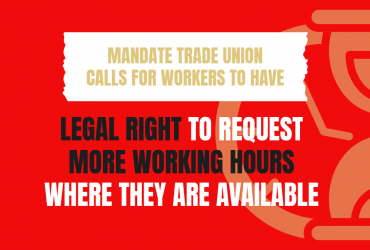Mandate calls on government to tackle plight of ‘precarious’ and underemployed workersPress Release
Friday 5 October 2012Global Day for Decent Work will be on this Sunday, the 7th of October , and the Mandate Trade Union has called on the government to tackle the plight of ‘precarious’ and underemployed workers in Ireland. Research conducted for Mandate earlier this year shows that almost four out of its members had reported a fall in take home pay over the last year, with the average fall being €109 per week. The research showed that the falling wages are driven primarily by cuts in the working hours of retail workers as well as increased taxes and levies.
In order to tackle this issue, Mandate’s General Secretary, John Douglas explained that the union will shortly publish a detailed policy paper on what the government needs to do to address the issues affecting these ‘precarious’ and underemployed workers.
“In order to tackle the flexibility trap – where precarious workers don’t get enough hours to earn a living wage, but can’t get another job. This problem is made worse by the PRSI system which incentivises the creation of precarious part-time jobs – Mandate is proposing that a new Code of Practice be put in place by Government to help workers access reasonable workers hours. In addition we will be seeking reform of the PRSI system to remove the incentive to employers to increase the number of precarious jobs.
“To deal with the income trap – where precarious and underemployed workers can’t earn enough to make ends meet, and can’t qualify for social welfare payments for the low paid or under-employed – the union is proposing the reform of Jobseeker’s payments to recognise the reality of precarious work. In addition, we will be looking for a temporary reduction in the number of working hours required to qualify workers for Family Income Supplement (FIS) and the introduction of a refundable tax credit for low paid workers.”
Mr Douglas said that to deal with the low skills trap that confronts many underemployed and precarious workers – which arises due to the fact that these workers need better training opportunities to get better jobs – Mandate is recommending that an effective training support system be put in place for these vulnerable workers.
John Douglas highlighted some of the main findings revealed by the research conducted on Mandate’s behalf by the market research company Behaviour & Attitudes earlier this year:
· 39% of Mandate’s members reported a fall in take home pay over the last year, with an average fall of €109 per week;
· Since 2011, on average, retail workers’ hours have declined by 4.3%. For part-time workers the decrease was 5.6% and for student workers it was 12.9%;
· The majority of Mandate members are on part-time contracts working an average of 22 hours per week. Over half of these work their hours over at least five days;
· Six in ten Mandate members were willing and able to work extra hours in order to make ends meet. Less than half of the part-time employees who asked for more hours got them;
· Many retail workers’ hours are subject to frequent change: for example, almost half of part-time workers have their working hours changed at least once a month, while only a third have stable working hours.
The research also revealed the impact that declining income and changing conditions are having on individuals and families:
· Around a third of Mandate members are finding it difficult to adequately feed and clothe their families, and to pay off household loans. Four in ten are experiencing difficulty paying their mortgage or rent, over half are struggling to pay utility bills;
· More than seven in ten reported that they had cut back on their spending so much that they can afford little or no social activities and that they are now far less likely to visit a doctor because they could not afford the cost;
· Three-quarters said that they are finding it more difficult to cope in general and suffer much more stress than a few years ago;
· Around one in ten had got a second job, and 17% had started to claim a social welfare payment. For a significant proportion, these options weren’t available: 11% of members reported that changes in their working patterns had made it more difficult for them to qualify for social welfare, and 13% said these had made it harder for them to secure another job;
· Around three in ten borrowed money from a credit union and from close family or friends, some had borrowed from more than one source
John Douglas concluded by saying that “The research shows that Ireland’s labour market crisis will not be solved with a more jobs at any cost strategy. We need to look at the quality of jobs that are being created otherwise we will just increase the number of working poor.”





